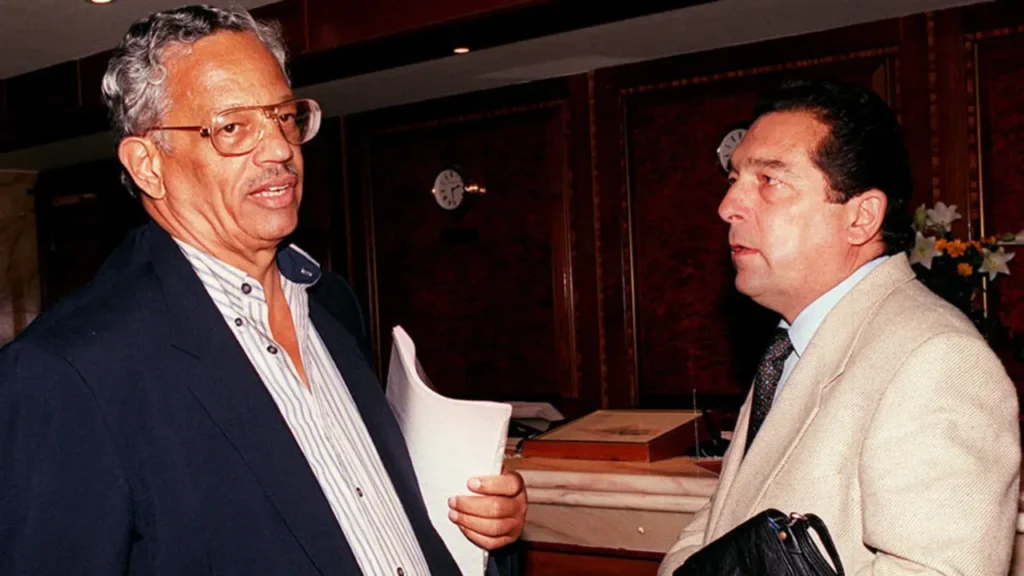
Being an attorney-at-law by trade, Rousseau was seen as a forward-thinking administrator due to the fact that he was responsible for establishing a professional structure and commencing the process of corporatization of the West Indies board.

There was a passing on Tuesday in Jamaica of Patrick Rousseau, who had previously served as the president of Cricket West Indies. At the age of 85, Rousseau, who was originally from Jamaica, passed away as a result of a protracted illness.
Between the years 1996 and 2001, Rousseau, who was a lawyer by trade, served as the chief executive officer of the Caribbean cricket team. In addition to commencing the process of corporatization of the West Indies Cricket Board, which was the name of the organization at the time, he was regarded as one of the visionary managers in the sport of cricket. He was responsible for bringing a professional framework to the organization.
An individual with a multifaceted personality, Rousseau, who was honored with the Order of Jamaica, played a significant role in the West Indies board’s successful quest to host the World Cup in 2007. In addition to that, he established the first professional cricket academy in the Caribbean, which was located in Greca. He brought on board Chris Dehring as the board’s marketing chief and the pair established a lucrative broadcast contract with Sky TV that played a part in the development of cricket in the region.
Rousseau created the greatest headlines around the turn of the millennium, when he led the board’s strong position against the players, who went on strike in 1998 before the South Africa trip. On the tour, West Indies lost the Test series 5-0 followed by another humiliation in the ODI leg when they lost 6-1 and questions were raised regarding Brian Lara’s captaincy.
During transit, en way to South Africa, Lara organized a revolt against the board seeking for better financial incentives. An deal was eventually struck and Lara, too, was retained as captain for the home series against Australia in March 1999. Lara was, however, warned his performance was being watched and he would be set performance targets. Malcolm Marshall and Clive Lloyd also lost their roles eventually as coach and manager respectively.
In March 2000, Lloyd was replaced by a business executive from St Kitts, Ricky Skerritt who, lately was voted as the CWI president. Incidentally, Skerritt’s tenure would be short-lived, stretching to only five series before he was terminated halfway through his three-year contract in 2001. Rousseau, at the time, had claimed that his board believed in making modifications “till we get the thing working efficiently.”
Rudi Webster, who served as psychologist with numerous West Indies teams, including Lloyd’s, was a close friend of Rousseau. After Rousseau’s death, Webster recalled the difficult interactions between the West Indies board and Lara’s crew.
“His great insight into reality was on display after the West Indies’ disastrous tour of South Africa where the players were reluctant to surrender part of their individual interests to build a platform on which the performance of the team and the revival of West Indies cricket could be built,” Webster said. “Back home, Brian Lara’s captaincy and place in the team were under close scrutiny.
“Pat told me that neither he nor any of his board members had the abilities to manage the situation satisfactorily and asked if I would consider supporting Brian during that period of difficulty. He knew that Lara will go down in history as one of the world’s best batsmen and did not intend to create any barriers in the way. His idea succeeded and Lara and his team performed incredibly well against the Australians here in the West Indies.”
In a public release, Skerritt commended Rousseau for being a “mentor” to many. “Pat was a strong man, always very focussed and determined,” Skerritt added. “He was a bright legal and business mind, and it was reflected during his period in control of the organisation between 1996 and 2001. Pat was also the driving factor behind the incorporation of the WICB in November 1998 – commencing the metamorphosis of the organisation into being a more corporate operation – and the permanent relocation of the Corporate Headquarters to Antigua.”
In a statement released by the ICC, the governing body’s chief executive, Manu Sawhney, said: “The death of Mr. Rousseau is terrible news for the cricket world. His contribution in the game’s management has been extensively praised. He led cricket administration in the West Indies quite capably and was a respected member of the ICC Board. It was with profound regret that we learnt of his death. On behalf of the ICC, I would like to convey our profound condolences to his friends and family and to our colleagues at the CWI.”
Leave a Reply